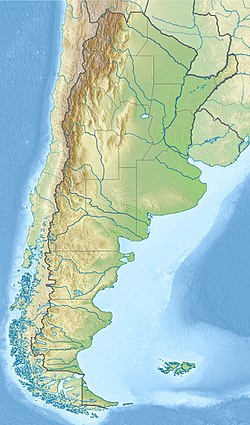Bajada Colorada Formation
| Bajada Colorada Formation | |
|---|---|
| Stratigraphic range: Late Berriasian-Early Valanginian ~ | |
| Type | Geological formation |
| Unit of | Mendoza Group |
| Underlies | Agrio Formation |
| Overlies | Quintuco & Picún Leufú Formations |
| Lithology | |
| Primary | Sandstone, conglomerate |
| Other | Siltstone, claystone |
| Location | |
| Coordinates | 39°48′S 69°42′W / 39.8°S 69.7°W |
| Approximate paleocoordinates | 38°48′S 32°12′W / 38.8°S 32.2°W |
| Region | Neuquén Province |
| Country | Argentina |
| Extent | Neuquén Basin |
| Type section | |
| Named by | Roll |
| Year defined | 1939 |
The Bajada Colorada Formation is a geologic formation of the southern Neuquén Province in the Neuquén Basin of northern Patagonia, Argentina. The formation belongs to the Mendoza Group and is Late Berriasian to Early Valanginian in age. The formation is renowned for preserving fossil remains of Bajadasaurus pronuspinax, a genus of dicraeosaurid dinosaurs named after the formation.
Description
[edit]The Bajada Colorada Formation, first defined by Roll in 1939, pertains to the Mendoza Group.[1] It overlies the Quintuco and Picún Leufú Formations and is overlain by the Agrio Formation. The contact with the Agrio Formation is discordant and the unconformity has been dated to 134 Ma.[2] The formation is laterally equivalent with the Mulichinco Formation.[3] The formation comprises red and greenish-brown, fine to coarse grained conglomerates and thick-bedded sandstones with well-developed bands of light brown siltstones and reddish, pinkish grey and purple-reddish claystones.[4] The formation was deposited in a fluvial environment, and the paleoenviroment resembled a braided river system with well-preserved channels and paleosols.[5]
X-ray diffraction studies of sediments belonging to the Bajada Colorada Formation have revealed the presence of smectite, chlorite, illite and kaolinite.[1]
Fossil content
[edit]The formation has provided fossils of:[6]
Color key
|
Notes Uncertain or tentative taxa are in small text; |
Dinosaurs
[edit]Ornithischians
[edit]| Ornithischians of the Bajada Colorada Formation | ||||||
|---|---|---|---|---|---|---|
| Genus | Species | Location | Stratigraphic position | Material | Notes | Images |
| Ankylosauria Indet.[7] | Indeterminate | |||||
Sauropods
[edit]| Sauropods of the Bajada Colorada Formation | ||||||
|---|---|---|---|---|---|---|
| Genus | Species | Location | Stratigraphic position | Material | Notes | Images |
| Bajadasaurus[8] | B. pronuspinax | A dicraeosaurid sauropod | ||||
| Leinkupal[9] | L. laticauda | A diplodocine diplodocid | ||||
| Ninjatitan[10] | N. zapatai | A titanosaurian sauropod | ||||
Theropods
[edit]| Theropods of the Bajada Colorada Formation | ||||||
|---|---|---|---|---|---|---|
| Genus | Species | Location | Stratigraphic position | Material | Notes | Images |
| Abelisauridae Indet.[11] | Indeterminate | |||||
| Abelisauroidea Indet. | Indeterminate | |||||
| Deinonychosauria Indet. | Indeterminate | |||||
| Tetanurae Indet. | Indeterminate | |||||
See also
[edit]- List of dinosaur-bearing rock formations
- Baños del Flaco Formation, contemporaneous formation of the Mendoza Group in Chile
- Chon Aike Formation, contemporaneous formation of central Patagonia
References
[edit]- ^ a b Moyano Bohórquez, 2004
- ^ Leanza, 2005, p.151
- ^ Howell et al., 2005, p.4
- ^ Leanza et al., 2011, p.120
- ^ Gallina et al., 2014, p.2
- ^ Bajada Colorada locality at Fossilworks.org
- ^ Rozadilla, Sebastián; Agnolín, Federico; Manabe, Makoto; Tsuihiji, Takanobu; Novas, Fernando E. (September 2021). "Ornithischian remains from the Chorrillo Formation (Upper Cretaceous), southern Patagonia, Argentina, and their implications on ornithischian paleobiogeography in the Southern Hemisphere". Cretaceous Research. 125: 104881. Bibcode:2021CrRes.12504881R. doi:10.1016/j.cretres.2021.104881.
- ^ Pablo A. Gallina; Sebastián Apesteguía; Juan I. Canale; Alejandro Haluza (2019). "A new long-spined dinosaur from Patagonia sheds light on sauropod defense system". Scientific Reports. 9 (1): Article number 1392. Bibcode:2019NatSR...9.1392G. doi:10.1038/s41598-018-37943-3. PMC 6362061. PMID 30718633.
- ^ Pablo A. Gallina; Sebastián Apesteguía; Alejandro Haluza; Juan I. Canale (2014). "A Diplodocid Sauropod Survivor from the Early Cretaceous of South America". PLOS ONE. 9 (5): e97128. Bibcode:2014PLoSO...997128G. doi:10.1371/journal.pone.0097128. PMC 4020797. PMID 24828328.
- ^ Gallina PA, Canale JI, Carballido JL (2021-02-28). "The Earliest Known Titanosaur Sauropod Dinosaur". Ameghiniana. 58 (1): 35–51. doi:10.5710/AMGH.20.08.2020.3376. ISSN 1851-8044. S2CID 226680080.
- ^ Juan I. Canale; S. Apesteguía; P.A. Gallina; F.A. Gianechini; A. Haluza (2017). "The oldest theropods from the Neuquén Basin: Predatory dinosaur diversity from the Bajada Colorada Formation (Lower Cretaceous: Berriasian–Valanginian), Neuquén, Argentina". Cretaceous Research. 71: 63–78. Bibcode:2017CrRes..71...63C. doi:10.1016/j.cretres.2016.11.010. hdl:11336/109121.
Bibliography
[edit]- Gallina, Pablo A.; Apesteguía, Sebastián; Haluza, Alejandro; Canale, Juan I. (2014), "A Diplodocid Sauropod Survivor from the Early Cretaceous of South America", PLoS ONE, 9 (5): e97128, Bibcode:2014PLoSO...997128G, doi:10.1371/journal.pone.0097128, hdl:11336/6526, PMC 4020797, PMID 24828328
- Howell, John A.; Schwartz, Ernesto; Spalletti, Luis A.; Veiga, Gonzalo D. (2005), "The Neuquén Basin: An overview", Geological Society, London, Special Publications, 252 (1): 1–14, Bibcode:2005GSLSP.252....1H, doi:10.1144/GSL.SP.2005.252.01.01, retrieved 2019-02-14
- Leanza, Héctor A.; Sattler, Federico; Martínez, Ricardo S.; Carbone, Osvaldo (2011), La formación Vaca Muerta y equivalentes (Jurásico tardío-Cretácico temprano) en la Cuenca Neuquina, XVIII Congreso Geológico Argentino, pp. 113–129, retrieved 2019-02-14
- Leanza, Héctor A (2005), "Las principales discordancias del Jurásico Superior y el Cretácico de la Cuenca Neuquina", Anales de la Academia Nacional de Ciencias Exactas, Físicas y Naturales, 57: 147–155, retrieved 2019-02-14
- Moyano Bohórquez, Fernando (2004), Los sistemas sedimentarios de la Formación Bajada Colorada (Cretácico Temprano) en el sur de la Cuenca Neuquina, Argentina, Universidad Nacional de La Plata, pp. 1–250, retrieved 2019-02-14

